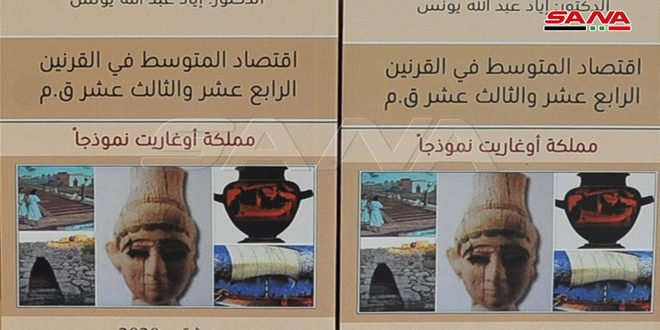With the participation of a number of researchers, translators and critics, a symposium was held at the Cultural Center in Abu Rummaneh in Damascus to review the researcher Dr. Eyad Yunes’s new book entitled “The Economy of the Mediterranean in the Fourteenth and Thirteenth Centuries BC .. The Kingdom of Ugarit as a Model”.
The author of the book Dr. Yunes told SANA that economic researches in the field of ancient historical studies are emerging due to the interest of most historians in what is known as political history, whose events focus on the ruling personality at a time when most of the economic life of ancient civilized societies remains in limbo.
He pointed out that his book concentrated on studying the reality of a nation that achieved an integrated civilization despite its difficult geographical nature .
Dr. Yunes stressed that Ugarit’s distinguished site made it occupy an important position on the ancient civilizations map , adding through research we realized have the greatness of the Syrian Ugaritic human being and how he worked to build an integrated economy despite the narrow agricultural areas and the ruggedness of some areas.
On his part, the translator and researcher Ahmed Al-Ibrahim said that Yunes’s book is of great importance as it takes us on an interesting journey through ancient Syrian history, not inside the palaces of kings and sultans, but in the plateaus and plains and between the streets of ancient cities.
Al-Ibrahim added that the book made us see how the son of this land used to cultivate his land, write his civilization and manage his affairs through an advanced economic mechanism and state institutions within a great city.
He considered the book as a call to every Syrian to realize his deep-rooted history.
In turn, the critic and writer Nazir Jaafar noted that the book reviewed the history and details of the daily life of the Ugaritic community with a new vision that is unprecedented in its comprehensiveness, multiplicity of its sources, important conclusions and indexes of maps, tables and figures.
He pointed out that the one who does not realize his past, history as well as tangible and intangible cultural heritage will not understand his present nor his position among the nations, hence the importance of this book, which highlights an ancient stage of the history of our region in general and the history of the Kingdom of Ugarit on the Syrian coast in particular a stage that is almost unknown to many.
Rawaa Ghanam

